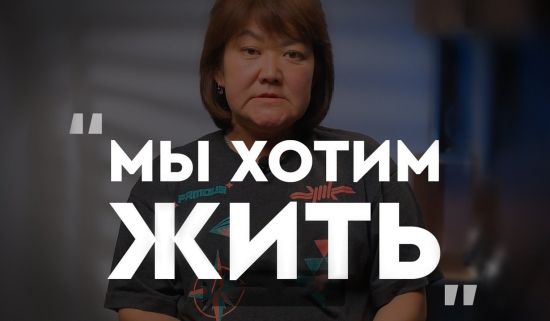Kyrgyzstan’s MPs put vital HIV funding at risk over ‘national traditions’
People living with HIV/AIDS said missing out on the $29m Global Fund grant would have “catastrophic consequences”
Kamila Eshalieva May 16, 2023

A poster from the Kyrgyz AIDS Centre says "Against Stigma" | Kyrgyzstan AIDS Centre
“Within a year, the entire system for diagnosing HIV and tuberculosis will begin to collapse,” Aibar Sultangaziyev, deputy chair of the HIV/AIDS coordinating committee board, told openDemocracy.
“The entire laboratory network, updating the infrastructure of laboratories, purchasing substances used to carry out laboratory tests and much more – all this is carried out with money from the Global Fund.”
Around 70% of the Fund’s grant to Kyrgyzstan goes on HIV and AIDs programmes, Sultangaziyev said.
The Global Fund told openDemocracy it is currently reviewing Kyrgyzstan’s application for assistance, and will make a decision on the basis of that review.
Life for people with HIV
Anna Babadzhanova is one of the estimated 12,500 people in Kyrgyzstan living with HIV or AIDS. She has seen the stigma against people with the chronic disease up close.
“Once my husband [who has AIDS] and I came to the hospital and the doctor said to me: ‘Why are you hanging around with this AIDS person, he will die anyway?’,” she told openDemocracy. That moment, she says, made her realise that she “wanted to set an example for others” by being open about her own diagnosis.
Babadzhanova works as a consultant for a health and education youth charity in Talas, in north-west Kyrgyzstan – the only organisation in the city providing assistance to people with HIV.
Babadzhanova says stigma is a major obstacle for those who would like to share their pain and ask for support; people are afraid they will be misunderstood, fired from their jobs or kicked out of their homes. The stereotypes from the 1990s, that HIV is transmitted through day-to-day contact, are too strong in Kyrgyz society, she says.
Babadzhanova is particularly concerned about how the healthcare system treats people, claiming that confidentiality about diagnosis is often “not respected in medical institutions”.
“If one doctor tells another about a patient’s HIV status, the whole hospital will soon know about it. People cannot understand and accept that HIV is a chronic disease,” Babadzhanova says.

An HIV-positive Kyrgyz woman says 'We want to live' in a segment explaining the crisis looming for people with HIV/AIDS in Kyrgyzstan on the bashtaaaaaaa Instagram page | @bashtaaaaaaa
Antiretroviral therapy (ART), which blocks the reproduction of the HIV virus in the body, helps prevent the development of AIDS. If they start the drug regimen early enough, people can live a long and fulfilling life: relationships, family and careers are all possible.
Now, Kyrgyzstanis living with HIV could be left without these services or medicines.
“Many politicians consider us second class and do not even understand this topic. Why do they not want to hear us? It seems we are not citizens of our own country. If the Global Fund stops allocating money for the prevention of HIV and AIDS, we will no longer be needed,” Askar*, who recently discovered his HIV status, told openDemocracy.
According to a UNAIDS report from 2020, the upward trend in new HIV cases in Kyrgyzstan continues. This is partly due to an increase in testing volumes; every month, the AIDS Centre conducts more than 4,000 lab tests to detect infection.
[If funding is stopped] it will lead to an increase in mortality among citizens. There will be catastrophic consequences
Aibar Sultangaziyev, coordinating committee
Sultangaziyev told openDemocracy that a country can only apply to the Global Fund to support its programmes on behalf of a coordinating committee.
And if funding is stopped, people “will not be able to find out whether their treatment is effective or not. There won’t be any chance to test for drug resistance,” he said.
“All this will lead to an increase in mortality among citizens. There will be catastrophic consequences that will affect the growth of the epidemic,” he continued. He added that children with HIV are likely to be left without any treatment as antiretroviral drugs for them are bought from abroad and there are none on the local market.
“My life, the lives of thousands of people, depend on [the HIV/AIDS programme],” Babadzhanova told openDemocracy.
“Shutting off access to treatment, testing and prevention is stupid. If people start dying from HIV infection, nothing will help them. The only thing that can help is ART, and it simply will not exist in the country.”
‘High corruption risks’
International support for Kyrgyzstan’s prevention and treatment programmes has been a source of contention over the past decade.
The Global Fund, which was set up in 2002 to fight AIDS, tuberculosis and malaria worldwide, first came to Kyrgyzstan in 2003. In 2009, prosecutors discovered irregularities in the implementation of a $47m grant: it turned out that $120,000 had been misused. A criminal investigation was opened, but no suspects were ever identified.
The Fund later penalised Kyrgyzstan by cutting the grant by double the amount misused - $240,000.
In 2011, the Fund decided to transfer grant management from the country’s Ministry of Health to the local office of the United Nations Development Programme. Kyrgyzstan’s coordinating committee to fight HIV/AIDS, tuberculosis and malaria was also set up in 2011, to apply for grants and manage the distribution of funds. To ensure transparency, the committee was overseen by Kyrgyz civil society, government agencies and lawmakers.
Since then, the health ministry has tried to regain the right to manage donor money, but in 2017 the Fund refused to hand over control of the grant, citing “high corruption risks”.
The dissolving of the committee followed two months of heated discussions in parliament over the funding application to fight HIV/AIDS and tuberculosis. In early March, MP Zhyldyz Sadyrbayeva was indignant at the fact that part of the grant ($884,000) was earmarked for key groups, including the Kyrgyz LGBTQ+ community.
“The state should be able to control the spending of such enormous sums,” Sadyrbayeva said, arguing that the health ministry should regain control of the grant.
The debate grew more intense in April when MPs found out what the preventative programme involved: tests, distribution of condoms, and provision of information about the disease. That led to heated and homophobic criticism.
The Kyrgyz cabinet of ministers did not respond to openDemocracy’s request for comment.
* Names have been changed
This article is published under a Creative Commons Attribution-NonCommercial 4.0 International licence. If you have any queries about republishing please contact us. Please check individual images for licensing details.
Contact:
Julian Richards
Julian Richards@julian.richards@opendemocracy.net
Source: openDemocracy https://www.opendemocracy.net/en/odr/kyrgyzstan-global-fund-hiv-aids-programme/
"Reproduced with permission - openDemocracy"
openDemocracy
For more HIV and AIDS News visit...
Positively Positive - Living with HIV/AIDS:
HIV/AIDS News
|